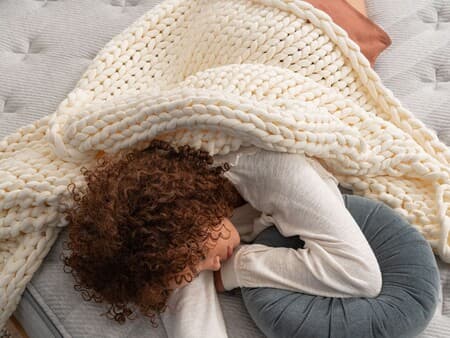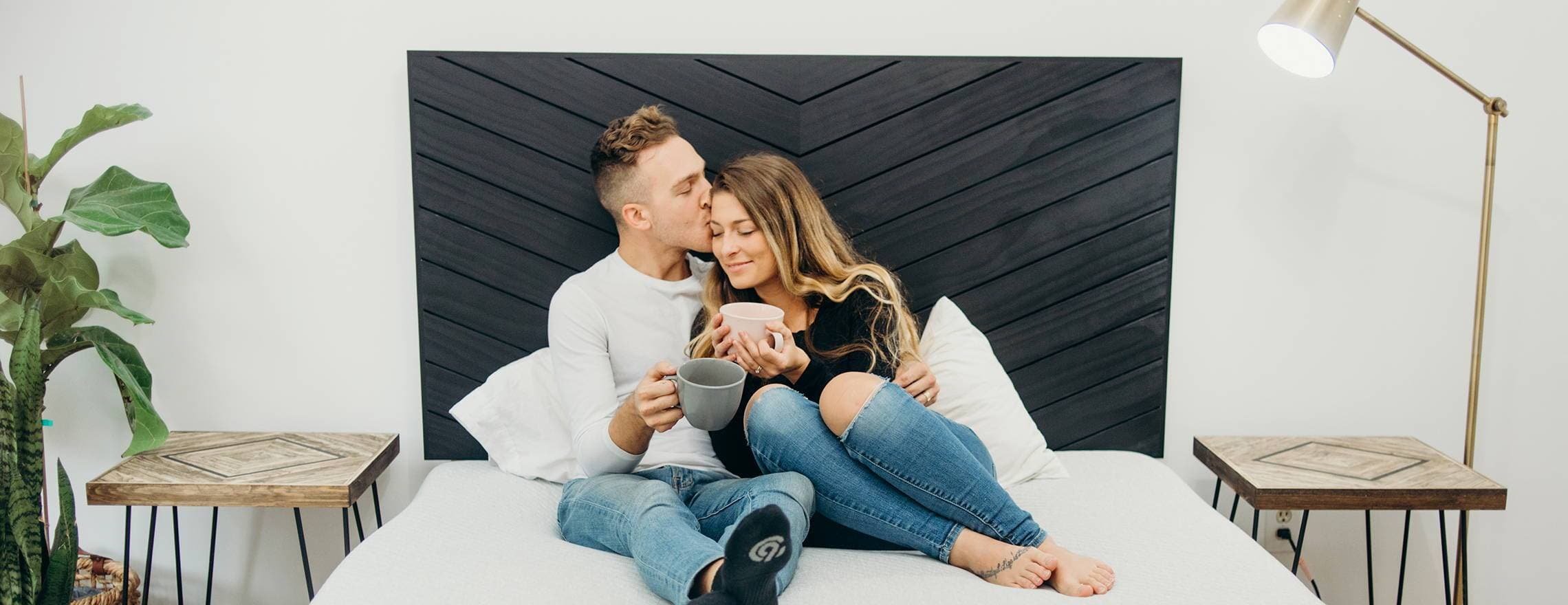Seems like everyone is talking about how great sleeping with a weighted blanket is. Why?
Imagine being gently hugged as you're lulled into sleep; sleeping with a weighted blanket can feel just like that. The trick is to choose your weighted blanket according to your body weight — the right weight should be about 10% of your total weight. So, if you weigh 150 pounds, a 15-pound blanket would feel "just right" as Goldilocks would say.
Let's take a look at the benefits of weighted blankets and who benefits the most from sleeping with one.
What Exactly is a Weighted Blanket?
A weighted blanket is usually made of thicker material than a standard, traditional blanket. Many have little pockets into which beads of plastic or glass are stitched. Some weighted blankets are hand-knit from heavy wool. Others have a cooling side and a warming side as part of their design.
The blanket applies deep pressure stimulation to the body, helping reduce anxiety and ease you into deep REM sleep faster. The result? A good night's rest with less interrupted sleep.
Weighted blankets have also been shown to help people with the following issues:
Anxiety and depression
Insomnia
Chronic pain
Autism
ADHD
Restless leg syndrome
But even for people without these conditions, a weighted blanket can help them fall asleep faster and stay asleep, without those annoying middle-of-the-night wake-ups.
Mental and Physical Benefits of Sleeping With a Weighted Blanket
Adding a weighted blanket to your sleep sanctuary can help you build better sleep hygiene habits by encouraging your body to fall asleep faster. But that’s not all, sleeping with a weighted blanket can provide many physical and psychological benefits.
Improve Your Sleep Quality
A weighted blanket applies gentle, even pressure to the entire body. Most people say this helps them fall asleep faster, reduces tossing and turning, and helps them relax deeply.
Think of using a weighted blanket as something like swaddling a newborn. The light pressure of a weighted blanket stimulates the body to produce more melatonin (the sleep hormone). As well as serotonin (the happy hormone), while reducing the production of cortisol (the fight or flight hormone).
Calm Your Nervous System
Sleeping with a weighted blanket has been scientifically proven to reduce symptoms of anxiety, such as shortness of breath or a rapid heartbeat. Weighted blankets also show some promise in helping with emotional and physical regulation.
Who Can Benefit From a Weighted Blanket?
Many people experience significant benefits from adding a weighted blanket to their bedtime routine. Weighted blankets have been shown to help people with the following issues:
People With High Anxiety
In today's hectic world, many people experience anxiety and may not even be aware that their nervous system is on overdrive. Anxiety symptoms can include:
Feeling tense or restless
Having a sense of impending danger or panic
Increased heart rate
Rapid breathing
Sweating
Trembling or shaking
Feeling weak or tired
Trouble concentrating
Digestive problems
Medication, psychotherapy, mindfulness, and therapeutic activities are often needed for anxiety or post-traumatic stress disorder (PTSD). Which affects many military veterans, first responders, and survivors of disasters. Even if your anxiety is comparatively mild, it's important to reduce anything that induces stress, especially before bedtime.
Many people with anxiety disorders report benefits of sleeping with a weighted blanket. Including relaxing more deeply, feeling more secure, and enhancing overall well-being. Since anxiety often goes hand-in-hand with depression, weighted blankets have also been found to help with other mental health issues, including bipolar disorder.
People on the Autism Spectrum
Autism is quite common. According to the CDC , about 1 in every 44 children in the U.S. have autism symptoms, according to a study completed in 2021. The most common symptoms include challenges with social communication (eye contact, social interactions), repetitive behaviors or movements, and extreme emotional reactions.
Of course, these are all challenging behavioral and emotional issues, not only for the person on the spectrum but also for their family. That's why it's good news that both children and adults on the autism spectrum often find that sleeping with a weighted blanket helps them relax. As the blanket's comfortable pressure shifts their focus away from annoying stimuli like noises, odors, or obsessive thoughts.
But not always. If a person on the spectrum likes the feeling of pressure or being bundled up in warm clothing, they'll likely love a weighted blanket. But if they don't care for the sensation of weight or pressure, a weighted blanket may make them feel trapped and claustrophobic.
People With Sleep Disorders Like Insomnia
According to the Centers for Disease Control (CDC), some of the most common sleep disorders are insomnia and restless leg syndrome (RLS). And studies suggest that weighted blankets can provide relief to those who suffer from either one!
Always consult your doctor before using a weighted blanket if you have a sleep disorder.
People With Chronic Pain
More than 50 million adults in the U.S. experience chronic pain, defined as persistent pain lasting more than three months. Of course, such pain is debilitating.
A recent randomized controlled trial using weighted blankets suggests sleeping with a weighted blanket helps relieve chronic pain . The deep pressure provided by a 15-pound weighted blanket helped relieve the perception of pain, as well as the anxiety caused by it. This means a weighted blanket can become part of a non-drug arsenal for the home-based care of people with chronic pain.
People With ADHD
Whether it's a child or an adult with ADHD, feelings of sensory overload are common, in addition to feeling jittery and easily distracted. Part of this is because Sensory Processing Disorder (SPD) often accompanies ADHD.
SPD makes individuals susceptible to overstimulation by sights, sounds, tastes, and textures. Sleeping with a weighted blanket activates the sense of touch, which can keep a person with ADHD from becoming distracted by other stimuli.
Who Shouldn't Use a Weighted Blanket?
Reconsider using a weighted blanket if you have been diagnosed with the following. Obstructive sleep apnea, severe asthma, Type II diabetes, or suffer from chronic low blood pressure.
Additionally, frail, elderly people who might have difficulty moving a weighted blanket should not acquire one. Neither should weighted blankets be used with infants, toddlers, and young children, due to the danger of possible suffocation.
But for everyone else, sleeping with a weighted blanket may be the ticket to sleep heaven (along with your Leesa mattress and foundation, of course).
How Do Weighted Blankets Work?
Weighted blankets use heavy fillers or extremely dense yarn to add weight and heft. As a result, many weighted blankets are warmer than their traditional counterparts.
Remember: the ideal weight ratio is that the blanket should weigh around 10 percent of your body weight. If it's not heavy enough, you won't notice a difference. And if it's too heavy, the blanket may be uncomfortable and keep you from moving comfortably.
Also bear in mind that if your weighted blanket contains pockets filled with plastic or glass beads? It's prudent to put it in a duvet cover in case any of the beads leak.
Takeaways
Should you make a weighted blanket part of your sleep sanctuary? The answer is a definite maybe.
Weighted blankets are touted as reducing anxiety and promoting deep, relaxing sleep. But the science behind weighted blankets is not yet complete. We do know a weighted blanket can calm the nervous system and improve sleep hygiene and quality for many users. There's evidence that weighted blankets are helpful for chronic pain, insomnia, ADHD, and people on the autism spectrum.
But other health conditions may make you think twice about using a weighted blanket, including obstructive sleep apnea, Type II diabetes, or low blood pressure.
Always speak to your doctor for advice about whether you should be sleeping with a weighted blanket. And if you're seeking the best sleep of your life, check out Leesa's fantastic mattresses and bedding.



